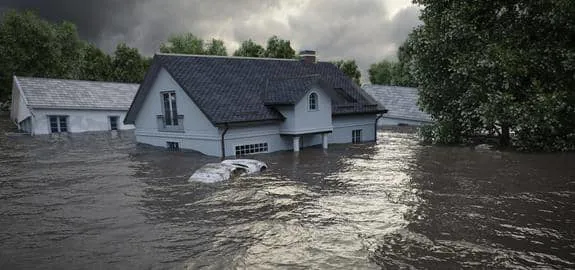
In simple terms, an act of God is an event beyond your control or your ability to predict that damages your home’s structure or belongings.
What qualifies as a covered act of God? That’s hard to pin down. Most acts of God are naturally occurring events, but they’re not all covered by home insurance equally, if at all. As examples, damage to your home due to rain is often covered by home insurance. At the same time, standard home insurance almost never covers flood damage.
While some natural events are never covered under standard home insurance, there are often specific insurance policies that can provide coverage against natural disasters.
This article will cover:
- The definition of an act of God
- Does my home insurance cover acts of God?
- Home insurance options for excluded natural disasters
Insurance definition of act of God
In terms of home insurance, an act of God is an event (or “peril”) that damages your home and that cannot be prevented regardless of how much care or caution you personally pay. Act of God events often share three criteria:
- They cannot be predicted
- They’re inescapable
- They’re beyond the control of both you and your home insurance provider
Are acts of God covered by home insurance?
While the above criteria tend to be the key points by which your home insurance company judges acts of God, it’s important to know that providers don’t cover all natural disasters that fall under the term. Damage due to flood and heavy snow are both naturally occurring events, but of the two, only flood is excluded from home insurance coverage.
There is a common misconception that comprehensive home insurance, often called an HO-5 policy, covers any type of natural disaster. This is unfortunately not true. HO-5 policies may specifically name what they do not cover, and disasters such as flood or earthquake are typically among those excluded perils.
The only real indicator of which perils are and are not covered by your home insurance is the terms of your policy. Read it over carefully to know what your home insurer considers an act of God.
While which perils constitute an act of God may vary from insurer to insurer, the following events are excluded by all standard homeowners insurance:
- Earthquake
- Flood
- Mud or landslide
Following are some examples of perils that commonly fall under acts of God:
- Rain
- Hail
- Snow
- Lightning
Note that an act of God does not absolve you from liability. Insurers expect you to take reasonable care of your home. This takes precedence over any damage done by any covered natural event.
For example, say a hailstorm does significant damage to your roof. If it turns out that the roof was not well-maintained and proper upkeep would have reduced the damage, you wouldn’t likely be able to claim it as an act of God.
Disputes with act of God claims
If you need to file a damage claim due to an act of God, you may find your settlement unsatisfactory or outright denied by your home insurance company. You may have a dispute over what is or isn’t covered, as well as how your claim was valued. In some cases, your denial may be cut and dry — for example, typical home insurance simply doesn’t cover damage from an earthquake.
But it’s not always so simple. There are steps you can take to dispute a denied claim. If you think that your home insurer made an error while assessing your claim, contact them and explain why. If you have the documentation to back it up, you could get a different outcome.
In the event that your claim payout is less than you wanted and discussing it with your home insurer doesn’t work, consider hiring a public claims adjuster as a final resort. A public claims adjuster understands the claims process and may give you a better chance of getting a satisfactory payout.
Insurance coverage options for excluded acts of God
Extreme acts of God, such as floods, earthquakes and landslides, are usually excluded from home insurance policies. This is usually because the large amount of damage they do would make home insurance premiums unaffordable to the public. Fortunately, you can usually purchase insurance separately to provide coverage for them.
Flood
FEMA defines a flood as “a general and temporary condition of partial or complete inundation of two or more acres and two or more properties of normally dry land”. Flood insurance is available through insurance agents who take part in FEMA’s National Flood Insurance Program (NFIP). Some private insurance companies provide flood insurance as well.
Earthquake
The United States Geological Survey classifies 16 states as high earthquake risks. If your home is in any of these states, the potential damage is enormous. Earthquake insurance is available through most providers.
Landslide
Damage to your home due to a landslide is complicated. Standard home insurance does not cover damage due to landslides. Furthermore, if you have earthquake insurance and an earthquake causes a landslide that damages your home, earthquake insurance would not cover the landslide damage.
If you live in an area where landslides are a frequent danger, landslide insurance is highly recommended.
References:
QuoteWizard.com LLC has made every effort to ensure that the information on this site is correct, but we cannot guarantee that it is free of inaccuracies, errors, or omissions. All content and services provided on or through this site are provided "as is" and "as available" for use. QuoteWizard.com LLC makes no representations or warranties of any kind, express or implied, as to the operation of this site or to the information, content, materials, or products included on this site. You expressly agree that your use of this site is at your sole risk.